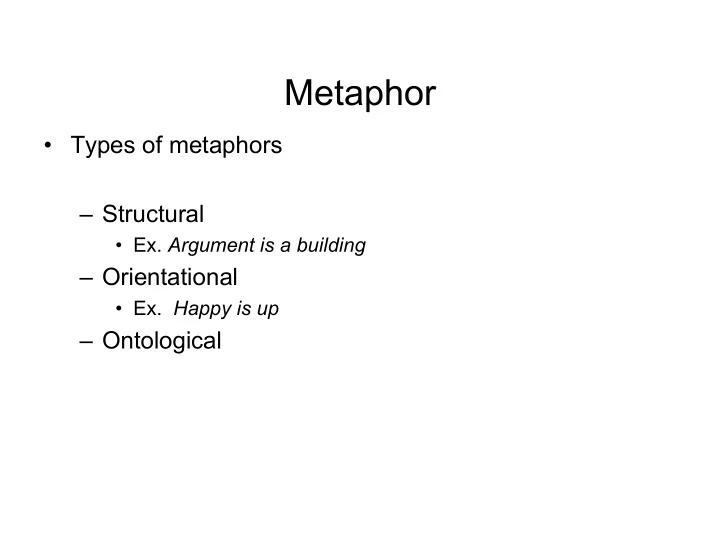

Metaphor • Types of metaphors – Structural • Ex. Argument is a building – Orientational • Ex. Happy is up – Ontological
Metaphor – Superficial incoherence as a result of different experiential bases for same metaphor • Unknown is up; known is down – It’s still up in the air. – The matter is settled. – He’s got it down cold. • Unfinished is down; finished is up – We’re just finishing up.
Metaphor – Shared metaphorical language is potential source of ambiguity • Inflation/depression is increasing • Happiness/health is increasing
Metaphor – Ontological Metaphors • Ontological - related to being/existence • A kind of metaphor whereby abstract, unwieldy or fuzzy concepts are viewed as objects with human scale and interaction potential – Inflation is lowering our standard of living – Buying land is the best way of dealing with inflation – Inflation makes me sick
Metaphor – Some purposes of ontological metaphors • Referring – We are working towards peace – The honor of our country is at stake in this war. • Quantifying – It will take a lot of patience to finish this book. – You’ve got too much hostility • Identifying aspects – The ugly side of his personality comes out under pressure – I can’t keep up with the pace of modern life
Metaphor • Identifying causes – He did it out of anger • Setting goals/motivating actions – He went to New York to seek fame and fortune – I’m changing my way of life so I can find true happiness
Metaphor – Elaborated ontological metaphors • The mind is an entity 1. The mind is a machine » We’re still trying to grind out the solution to this equation. » The wheels are turning now 2. The mind is a brittle object » Her ego is very fragile » He broke under cross-examination
Metaphor • Elaborated ontological metaphors – Container metaphors • Land areas – Geographical entities often fuzzily bounded » Woods, clearing, mountain range, California – We view as bounded containers » We went into the woods » There’s gold in them thar hills
Metaphor – Container metaphors • The visual field – The visual field – The ship is coming into view – He’s out of sight now • Events, actions, states – Are you in the race Sunday? – Halfway into the race I ran out of energy
Metaphor • Container metaphors – Events, actions, states • In washing the window, I splashed water all over the floor • How did Jerry get out of washing the windows? • How much window washing did you do? • I put a lot of energy into washing the windows • I get a lot of satisfaction out of washing windows. • He’s in love • I’m slowly getting into shape
Metaphor • Metaphor – Maps target domain onto source – Source often well defined, concrete – Target often often abstract – Source domain extends to target – Source domain and target domain are blended (Fauconnier)
Blending • Blending – Elements of two input spaces are projected into a third space, the blend, which contains elements of both, but is distinct from either one – Non-linguistic blending • Faces seen as combinations of parents’ features • Unicorns, satyrs, etc. • Wire crossing experiences
Blending • Blending – Linguistic blending • Linguistic expression evokes two domains, refers to something new • Traditional blends – Chocoholic, cranapple, Monicagate, frenemies – Brunch, motel, nectarine, smog • Metaphor – They constructed this theory from the ground up – You’re wasting my time
Blending • Blending – Linguistic blending • Grammatical/constructional blends 1. As far as his political views are concerned, it’s best not to say anything 2. As for his political views, it’s best not to say anything 3. As far as his political views, it’s best not to say anything 1. She sneezed 2. She knocked the napkin off the table 3. She sneezed the napkin off the table
Recommend
More recommend